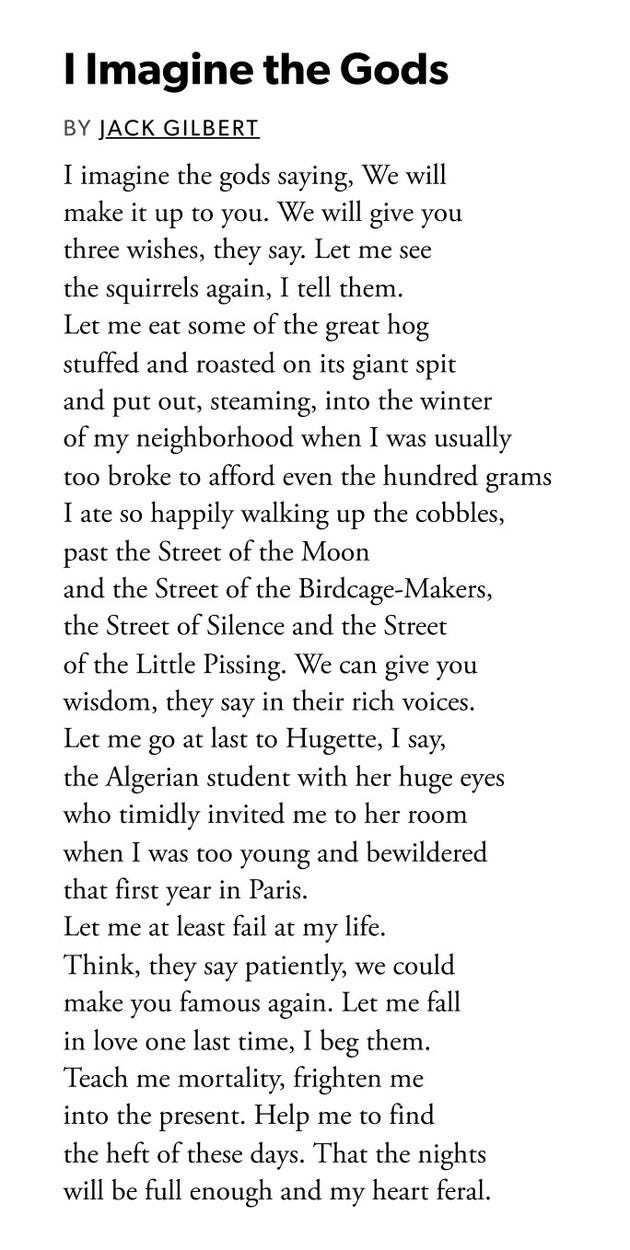How many of you can relate to the following scenario: you and your partner, or the person you live with, prefer your bacon in two different ways—you chewy, them crispy, or vice versa. (For non meat-eating people, maybe it’s that you like your seitan(?) crumbly(?) and the other party doesn’t. Or vice versa.) And of course you know this about each other, and so when one of you cooks breakfast you do your best to make some of the bacon in the other’s preferred style.
But then it rarely works out, right? You undercook their crispy bacon and they overcook yours because in your mind, no way did they actually want it that crispy or that rubbery, it couldn’t possibly be, because no sane person…etc. etc. It’s probably still what you might call “aggressively fine”,1 but it’s a difficult task to make something for someone else in just the way they want it. I don’t have kids but I imagine this is a daily realization for people who do.
Luckily, at least in my experience, the perfection-or-lack-thereof re: the food item is able to be overlooked because the act itself of trying to cook for someone the way they want it is rightfully seen for what it is, an act of love. In my classroom we spend a lot of time “unpacking the author’s purpose;” in other words, putting in the hard work required to understand that not everyone sees the world the way you do and makes their own choices accordingly. It is often difficult for teenagers to understand this.2
People in my peer group often refer to this phenomenon through the lens of Love Languages. If you’re unfamiliar, the general idea is that there are five (or six or seven, depending who you ask) of these languages, and most people identify strongly with one or two of them. In other words, you fill in the blank in the sentence “I feel most loved when I receive (words of affirmation, acts of service, gifts, quality time, and physical touch),” and in doing so your partner or family or close friends are better able to understand how best to make you feel loved.
I am generally wary of tidy concepts like these because in their prescriptive definitions is, I think, the danger a self-imposed artificial rigidity, or at least of putting the cart before the horse—making people start to want and expect certain things because that’s who they know they are, instead of figuring out who they are based on what they want and expect. But the framework here isn’t a bad one, all told. I know I do love a nice little treat and so when I’m at the store I often pick up a nice little treat for my wife or whoever else I’m going to be around, because I know I like little more than when that is done for me. (This is very possibly also just a selfless-seeming way for me to justify my own treat-getting habits. Nevertheless.)
For my wife’s part, she really can’t relax enough to fall asleep if there are dishes in the sink. That wouldn’t occur to me if she hadn’t told me, not because we have some kind of sitcom situation going on where I need to be constantly told to do the dishes by my harangued and put-upon spouse but because my four years of undergrad squalor a decade ago hardened me to conditions far worse than a few pots and pans being out and about. So now, when I think of it, I try to make sure the dishes are done before she gets home at night, or I do them while she unwinds on the couch. (I am hardwired for treats in a way that I am not for dishes, though, so this is something I’m still working on.)
It feels apt to bring this up, since we’re all so focused on gift-giving at this time of year.3 Considerations abound: how much to spend, and on whom, and what will be well-received and what will come off as a thoughtless last-second purchase. An anxiety-inducing endeavor, gift-giving, even for those of us who genuinely enjoy the exercise of trying to figure out what will make someone else happy to get. It is perhaps no less anxiety-inducing to receive gifts, trying to navigate your own feelings and those of the giver and putting yourself in their shoes on the willing assumption that they tried to put themselves into yours. That’s my goal for this holiday season: to try to ponder each gift, even ones I might otherwise suspect got phoned in, and try to imagine what it was about that thing that made someone else think of me. I hope that will make me appreciate them all the more.
What this boils down to, I think, is that we are all pretty good at giving people things or doing things for other people in the way that we know we would want them. We are maybe less good at giving people things or doing things for other people in exactly the way that they would want them. Some of this is just due to a lack of experience or understanding, some of it is surely selfishness or an inability to empathize or at least a failure to listen, and some of it is absolutely that at the end of the day we are each only one person and can do no better (or worse) than to put the products of our own little fragile hearts out there and hope they’re good enough for the people we care about.
I can think of no better way to wrap this all up than with one of my favorite poems, which embodies this tension between what is proffered and what is wished for.
Thanks, as always, for reading. I’ll talk to you next week.
-Chuck
PS - If you liked what you read here, why not subscribe and get this newsletter delivered to your inbox each week? It’s free and always will be.
Which is a semi-annoying phrase I’ve picked up from Twitter and would like to stop using.
It was hard for you to understand this when you were a teenager, I promise you. In case you were feeling a little smug there.
Yesterday was even “Giving Tuesday”—which I imagine was designed as a sort of karmic offset to Black Friday and Cyber Monday—and if you’re anything like me, you got roughly 5x as many emails as you do on an average Tuesday, exhorting you to give.

















Help Me To Find The Heft Of These Days